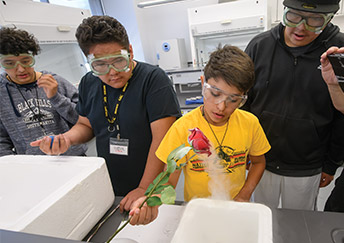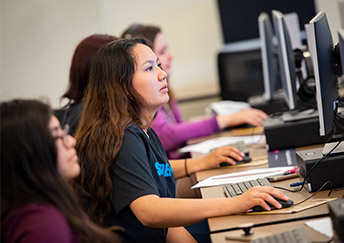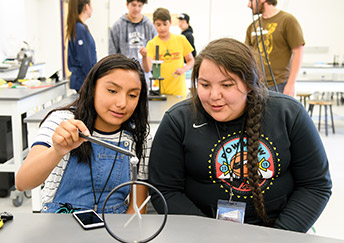
Contact Us
Institutional Communications
Bureau of Mines Building, Room 137
Laramie, WY 82071
Phone: (307) 766-2929
Email: cbaldwin@uwyo.edu
Building a Bridge
September 6, 2019

Nakowa Seminole, Ty Harris, Emiliano Jaime and Horace Littlesun experiment with freezing
various objects in liquid nitrogen at the Native American Summer Institute.
Programs support Native American students on their path to college.
By Micaela Myers
When senior psychology major Cyrille Mitchell first attended college, she had no idea what to expect. And when she transferred to the University of Wyoming, she didn’t know about many of the on-campus resources. Now, Mitchell, who is from the Confederated Tribes of Warm Springs in Oregon, is helping Native American high school students get a taste of what college is all about as a peer mentor for the UW Native American Summer Institute (NASI).
Native American Summer Institute
“It’s an awesome experience for the youth to get that college experience,” Mitchell says. “I think NASI is a great opportunity to encourage our Native students to seek that higher education.”
This summer marked the third year for the annual program that welcomes around 40 Native American youth to campus for a week each June. During the program, the high school students stay in residence halls, eat at the dining hall and connect with UW faculty, staff and current Native American students as they get to know the area and engage in exploratory tracks based on their academic areas of interest.
“It’s a direct pipeline from schools to UW,” says Angela Jaime, director of the Native American and Indigenous Studies Program. “While they’re here, they’re exposed to different kinds of majors. We also have a cultural piece, so it brings the academic and cultural together in a way that’s a nice blend. We’re showing them you don’t have to be one or the other. You bring your culture with you.”
While the free institute primarily recruits from the Wind River Indian Reservation area, students from neighboring states are also encouraged to attend. “It’s good for our students to meet students from other reservations, because they learn from each other,” says Native American Program Adviser Reinette Tendore.
In addition to the program for high school students, high school graduates and GED holders can take part in a Health Science Pathways program that runs in conjunction with NASI. It introduces students to health-related fields of study, such as nutrition, nursing, public health and communication disorders.
UW senior and Northern Arapaho tribal member Mia Holt—a dual major in Native American and indigenous studies and physiology from Lander—has served as a NASI mentor every year since the program started. In addition to university classes, she says that the students learn about admissions and financial aid and get to experience the Laramie area. “Last year, we did a scavenger hunt and went to the movies, and we went to Curt Gowdy and spent time paddleboarding,” she says. “It’s a really fun experience and something I enjoy being a part of.”
Jaime says, “It’s absolutely my dream to see so many Native students in one place thinking about going to college and seeing themselves going to college.”

Larami Azure and fellow students work on their presentations during the 2019 Upward
Bound and Upward Bound Math-Science Summer Program at UW.
Upward Bound
Two other programs working with Native American students on their path to college are Upward Bound and Upward Bound Math-Science. Upward Bound helps low-income and first-generation high school students with college access and success. Part of the Federal TRIO Programs first created by Congress in 1964, Upward Bound has been active in Wyoming ever since.
The program encourages students to set their own goals, and then helps them achieve them. College visits and virtual tours are also part of Upward Bound and enable students to see themselves there and determine the best fit.
Upward Bound works throughout the state, including serving Native American students at virtually every site. Candice Hudson serves as the project coordinator for Fremont County and works with seven schools, including the high schools on the reservation and in Lander and Riverton. She visits each school weekly and provides ACT prep, tutoring and financial literacy. Students receive a stipend for keeping their grades up and participating. Hudson says the mentoring, however, is just as important.
Her students especially love the college visits. “All the services are paid for. The students are very appreciative of it,” she says.
One of her students is Mary Harris, a senior at Wyoming Indian High School who plans to attend Central Wyoming College and then transfer to UW.
“Upward Bound has opened up a lot of opportunities for me,” Harris says. “I’ve been on a college trip with Candice to Idaho State University last spring. In 2018, I attended my first summer program with Upward Bound.”
Upward Bound’s six-week summer program takes place at UW and provides hands-on coursework and college prep free of charge.
Students who participate in Upward Bound see much higher success rates in enrollment and graduation.
Harris says, “If it wasn’t for Upward Bound, I would be totally scattered. I wouldn’t be as organized with my school work, class planning and other things in my daily life.”

Amaya HerManyHorses and Chris SingsInTheMountains try various physics experiments
at UW's Native American Summer Institute.
Student Educational Opportunity
Also part of TRIO, the Educational Opportunity Centers program aims to increase the number of adults enrolling in postsecondary education. Centers provide advising and information on college admissions to qualified adults and high school students. The program also provides services on financial aid options, including basic financial planning skills and assistance in the application process.
For 15 years, Teffany Fegler has served as coordinator of the Educational Opportunity Center in Ethete, serving Fremont County and the Wind River reservation. “A lot of the people I work with are nontraditional students, so they’ve been out of school for a while,” she says. “They might not know what they need to do first.”
The center in Ethete aids 300 to 400 individuals each year. “We help them with admissions, financial aid and getting their transcripts,” Fegler says. This can include paying for transcripts, helping returning students get comfortable with online processes and assisting with the Free Application for Federal Student Aid (FAFSA).
The center also does interest inventories for students who are not sure what area they want to go into, and the office connects students with advisers and student support at Central Wyoming College, UW and other colleges.
The center has been on the reservation since the 1970s, and Fegler works hard to develop relationships. She says that the fact that UW now has a Native American program adviser in Reinette Tendore and the Native American Education, Research and Cultural Center makes the university more appealing to Native American students. “It really helps now that they can check in with Reinette, and I know they have a place to go to have that family orientation they’re used to. That will be a huge asset to them and UW.”
Summer Research Apprentice Program
Launched in 1985, the Summer Research Apprentice Program (SRAP) is the longest-running education, outreach and diversity program under the purview of Wyoming EPSCoR, a program funded by the National Science Foundation (NSF). SRAP focuses on first-generation and underrepresented students considering college and aims to engage these youth in hands-on STEM-related activities. STEM stands for science, technology, engineering and math.
During the six-week program, students are paid as research apprentices and work in labs with professors and graduate students. SRAP enjoys a strong history of college placement among its alumni.
One of SRAP’s Native American alumni is Martina Brown from Fort Washakie. During the 2018 session, she and her team completed a research project titled “Nitrogen and its Effects on Chlorophyll in Brassica.”
“I gained a lot of knowledge in the botany lab and also with programming,” says Brown, who recently completed her senior year at St. Stephens Indian School and plans to study criminal justice in college.
Native American Pathways Program
To increase the number of Native American students earning their medical or pharmacy doctorates and then returning to serve their tribal communities, UW, Central Wyoming College and the NIH-funded Wyoming INBRE (IDeA Networks for Biomedical Research Excellence) program are developing a partnership with the University of Illinois at Rockford to support the Native American Pathways Program. The program identifies, recruits and supports Native American students on their path to medical school at Rockford.
“Part of the process will involve working with these students in high school, providing counseling and tutoring support, helping them develop the kind of high school record that will help them succeed academically, and then helping them through college and providing them resources so that they’re successful and competitive for professional school,” says R. Scott Seville, director of Wyoming INBRE.
Students could go to Central Wyoming College and then transfer to UW while being supported by the Native American Pathways Program and involved in INBRE-sponsored research and mentorship the entire time.
“The Rockford admissions committee will be composed of members from Rockford, Wyoming and the community, so it’s not just the academics,” Seville says, adding that students’ commitment to return to serve their tribal community is key. The final year of the program will be an externship on a reservation.
Seville says, “I think the students just need the resources and support. We’re getting in place that kind of pipeline.”
Contact Us
Institutional Communications
Bureau of Mines Building, Room 137
Laramie, WY 82071
Phone: (307) 766-2929
Email: cbaldwin@uwyo.edu


